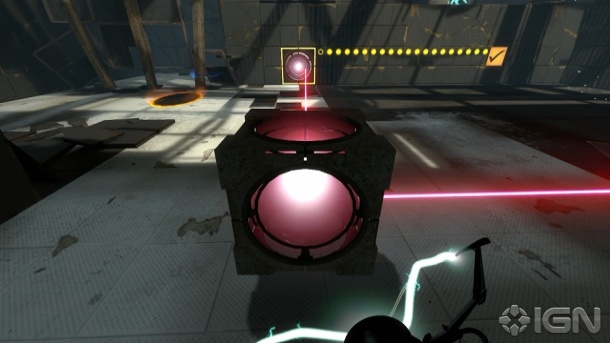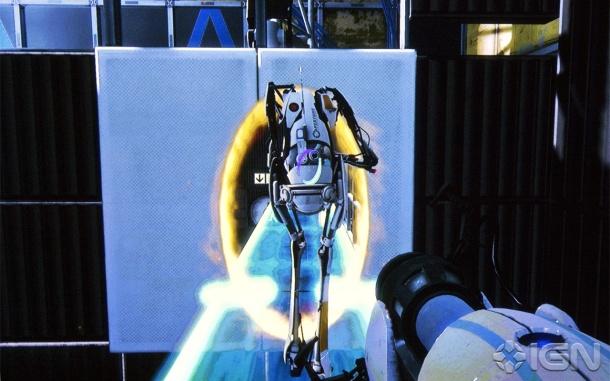Given Portal's meteoric rise to become one of the gems of the game world, a sequel was more-or-less inevitable, but questions and doubts lingered. Could Portal 2's writers possibly top what many (including yours truly) consider to be one of the finest examples of modern game writing? Would it be another three-hour experience? Worse, would it be a three-hour experience artificially dragged out to feel longer? Would the portal mechanic feel too gimmicky when stretched out over a longer game? I have to admit that I had my doubts about whether Valve could deliver a worthwhile, entertaining sequel to one of my favorite games of this generation. So, did they? In a word: No.
In several words: No, they somehow managed to craft a game that actually exceeded my expectations in nearly every way. Portal 2 is a near-perfect example of what can happen when all of the elements of modern game design are combined to create a beautifully cohesive whole. Perhaps not surprisingly to anyone who played the first game, Portal 2's lynchpin is its writing, which expands and expounds on a universe only touched on briefly in the original game. Over the course of Portal 2, I learned nearly everything about Aperture Science's storied history, including how the wonderful evil GlaDOS came to be, how those cute little turrets are made and tested, and why human research subjects aren't allowed to have nice things. The writers actually show a surprising amount of range this time out, deftly switching from sarcastic humor to sad pathos multiple times with ease.

Part of what makes Portal 2's writing so great is the near-constant stream of humor, both in its dialogue and in the many Easter eggs scattered about its 10 chapters. In the first game, the inhuman GLaDOS was the obvious star of the show, and while she makes an equally (and hilariously) mean-spirited return in Portal 2, she's not alone. The bumbling, spherical A.I. named Wheatley (pitch-perfectly voiced by British comedian Stephen Merchant) is sure to be a fan favorite, but for this editor's money, the show was completely and utterly stolen by the brusque Cave Johnson. The founder of Aperture Science (and former Shower Curtain Salesman of the Year) dedicated his life to the advancement of science, and it's hard not to feel oddly honored to take part in some of the experiments that ranged across his entire career. J.K. Simmons' (best known as J. Jonah Jameson in the Sam Raimi's Spider-Man films) voiceover adeptly blend gravitas and silliness, and I found his segment to be just as great the second time I played through the game.
Of course, even the best writing in the world wouldn't be able to save a puzzle game with crappy (read: unfair) puzzles, and thankfully, Portal 2 packs some truly mind-bending puzzles from start to finish. While it starts out with a variety of portal-to-portal puzzles that feel like they would have been right at home in the first game, the focus quickly shifts to include several new, highly entertaining puzzle mechanics. Yes, I still spent most of my time firing an orange portal onto one surface and a blue portal onto another to cross between them, but now there's propulsion gel that allowed me to run very fast, while repulsion gel was perfect for launching myself up to hard-to-reach places. Although these might sound gimmicky, the additions made it feel like each and every puzzle was beautifully crafted to make perfect sense (once I finally wrapped my head around it). Satisfying "Ah ha!" moments abound in Portal 2, making this one of the year's best puzzle games, if not the.
While the wonderful single-player campaign is a lot of fun, it's the new cooperative mode that really pushes Portal 2 into that rarefied "instant classic" air so many games fall just short of. Rather than simply shoehorning a co-op mode into the single-player game's template, the developers crafted an entirely new campaign, designed for two players from the ground up. The puzzles are quite a bit more challenging than those in the solo mode, and this definitely isn't a case when two heads are necessarily better than one. In fact, if my own experiences with the co-op mode are any indication, many players will accidentally kill each other quite often, only to laugh it off before jumping right back into the puzzles again and again until it's finished.

This is precisely what makes the co-op mode such a blast: the distinct emphasis on teamwork and communication, something seen far too rarely in many co-op games. It's quite literally impossible for the puzzles to be completed without both players working in unison, and those aforementioned "Ah ha!" moments found in the single-player game are magnified when playing co-op. Portal 2 "suggested" that I play co-op with friends when I was searching for a game, but I had plenty of great moments getting to know complete strangers during my time in this mode. If that isn't a testament to great co-op design, I don't know what is.
Sporting some of the best writing and voice work in years (as well as some deviously designed puzzles), Portal 2's single-player campaign is superior to its predecessor in every way. It's the co-op mode, however, that makes this 2011's first must-play game -- even for those gamers that don't like first-person or puzzle games.





 Outstanding!
Outstanding!


